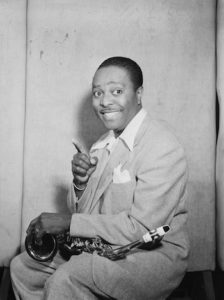
Louis Jordan, 1946
Louis Jordan was born on this date in 1908. He was a Black musician.
From Brinkley, Arkansas, he learned to play the clarinet and saxophone from his father, who led the band for the Rabbit Foot Minstrels (Jordan toured with them while still in high school). A graduate of Arkansas Baptist College, he made his professional debut with Jimmy Pryor (1929), working with Ruby Williams and other bandleaders in Arkansas before moving to Philadelphia to join the tuba player Jim Winters in 1932.
Jordan performed with Charlie Gaines (1933-5), the violinist Leroy Smith (1935-6), and Chick Webb (1936-8), and played briefly with Fats Waller and Kaiser Marshall before forming his ensemble to work in New York. This group, known as the Tympany Five, was tremendously popular in Harlem and throughout the rest of the country until the late 1950s. Jordan also appeared in films with the Tympany Five, including "Follow the Boys" (1944), "Meet Miss Bobby Sox" (1944), "Beware" (1946), "Swing Parade of 1946" (1946), "Reet, Petite and Gone" (1947), and "Lookout Sister" (1948).
He led a big band briefly during the 1950s, made a solo tour of England in 1962, toured Asia in 1967, and continued to work into the 1970s. Jordan combined showmanship and musicianship equally, becoming an influential force in rhythm-and-blues music in the late 1940s and the 1950s. As an improviser, he is best remembered for his work on the alto saxophone, but he also played the soprano, tenor, and baritone saxophones. He also wrote several songs, including "Five Guys Named Moe," "Is You Is, or Is You Ain't (Ma' Baby?)," "Choo Choo Ch'boogie," and "Saturday Night Fish Fry." Louis Jordan died on February 4, 1975.
All That Jazz: The Illustrated Story of Jazz Music
General Editor: Ronald Atkins
Copyright 1996, Carlton Books Limited
ISBN 0-76519-953-X
Image: William P. Gottlieb